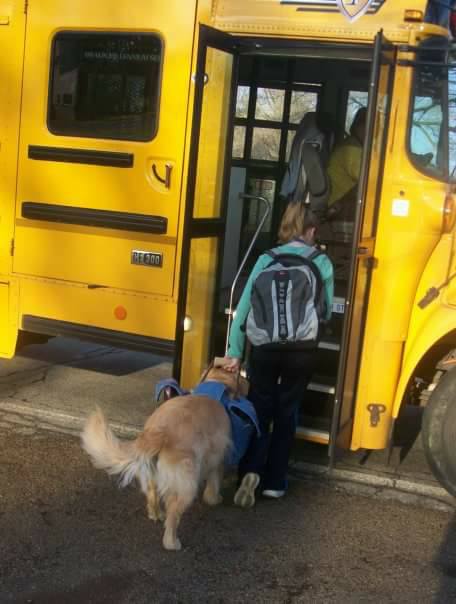By Rose Daly-Rooney, Legal Director
What’s on your child’s back-to-school list?
- Backpack
- Gel pens
- Binder
- Service animal
Does your child have a disability and use a service animal that helps her at home and in the community? Have you ever wondered whether she could take her service animal to school?
This post explores the rights of students with disabilities in kindergarten through 12th grade to bring their service animal to school under the Americans with Disabilities Act, or ADA, and Section 504 of the Rehabilitation Act.
Must schools permit service animals?
Yes, schools, like other public agencies, must modify their policies, practices, and procedures to permit the use of service animals by students (as well as their parents and visitors) at school and school activities, such as field trips.
What information may schools require before my child is permitted to bring her service animal to school?
Schools may ask whether the animal is required because of a disability and ask about the work or task the animal has been trained to perform, unless the answers to these two questions are apparent. In that case, they may not ask the questions. For example, if a student has a mobility impairment and the service animal pulls his wheelchair, no further inquiries should be made. Nor may schools require documentation, such as proof that the animal has been certified, trained, or licensed as a service animal, as a condition for entry onto the school grounds.
May a school refuse to allow my child’s service animal?
There are two situations when a school may require a service animal be removed from the school grounds: 1) the animal is out of control and the handler does not take effective action to control it; or 2) the animal is not housebroken. Under the ADA, service animals must be harnessed, leashed, or tethered while in schools and other public places unless these devices interfere with the service animal’s work or the student’s disability prevents use of these devices. In that case, the student (or a handler) must use voice, signal, or other effective means to maintain control of the animal.
Are schools responsible for providing the care and supervision of the service animal at school?
No, generally the student or an adult accompanying the student is responsible for the care and supervision of the service animal while in school and other public places.
What if my child needs adult assistance controlling or caring for the service animal?
The U.S. Department of Justice, or DOJ, statesthat K-12 schools may need to provide some assistance to enable a student to handle his or her service animal. For example, an aide or teacher may need to tether or untether the service animal from a student’s wrist because of the student’s manual dexterity impairment if she controls the service animal while tethered. Similarly, a school aide may need to accompany an 8-year-old student when he takes the service animal for a walk or to feed the service dog. However, if the student is unable to care for the service animal or control the service animal, even with some adult assistance, then the parent may need to provide the adult handler. The DOJ explains that the handler can be the person with the disability or a third party accompanying him.
Does the service animal need to be listed on my child’s Individual Education Plan (IEP) to gain access to the school?
No. First, not all students with disabilities qualify for special education and have an IEP. Students with disabilities, regardless of whether they qualify for special education and have an IEP, may bring a service animal to school. Second, students and their parents may elect to seek access for the service animal based on the ADA or Rehabilitation Act. The parents need not argue that the service animal is necessary for an appropriate education program in the least restrictive environment under the Individuals with Disabilities Education Act.
Tip: In order to work with your child’s school to make the first day the service animal accompanies your child to school a positive experience, you should consider calling the school and informing them in advance.
- If you believe your child’s rights to have a service animal accompany him or her to school have been violated, you may file a complaint with the S. Department of Education Office for Civil Rights or a complaint with the DOJ.
- If you need more information about your child’s right to have a service animal at school, call the ACDL.
DISCLAIMER:
THIS BLOG/WEB SITE IS MADE AVAILABLE BY ACDL FOR EDUCATIONAL PURPOSES ONLY AS WELL AS TO GIVE YOU GENERAL INFORMATION AND A GENERAL UNDERSTANDING OF THE LAW, NOT TO PROVIDE SPECIFIC LEGAL ADVICE. BY USING THIS BLOG SITE YOU UNDERSTAND THAT THERE IS NO ATTORNEY CLIENT RELATIONSHIP BETWEEN YOU AND ACDL. THE BLOG/WEB SITE SHOULD NOT BE USED AS A SUBSTITUTE FOR COMPETENT LEGAL ADVICE FROM A LICENSED PROFESSIONAL ATTORNEY IN YOUR STATE.


0 Comments